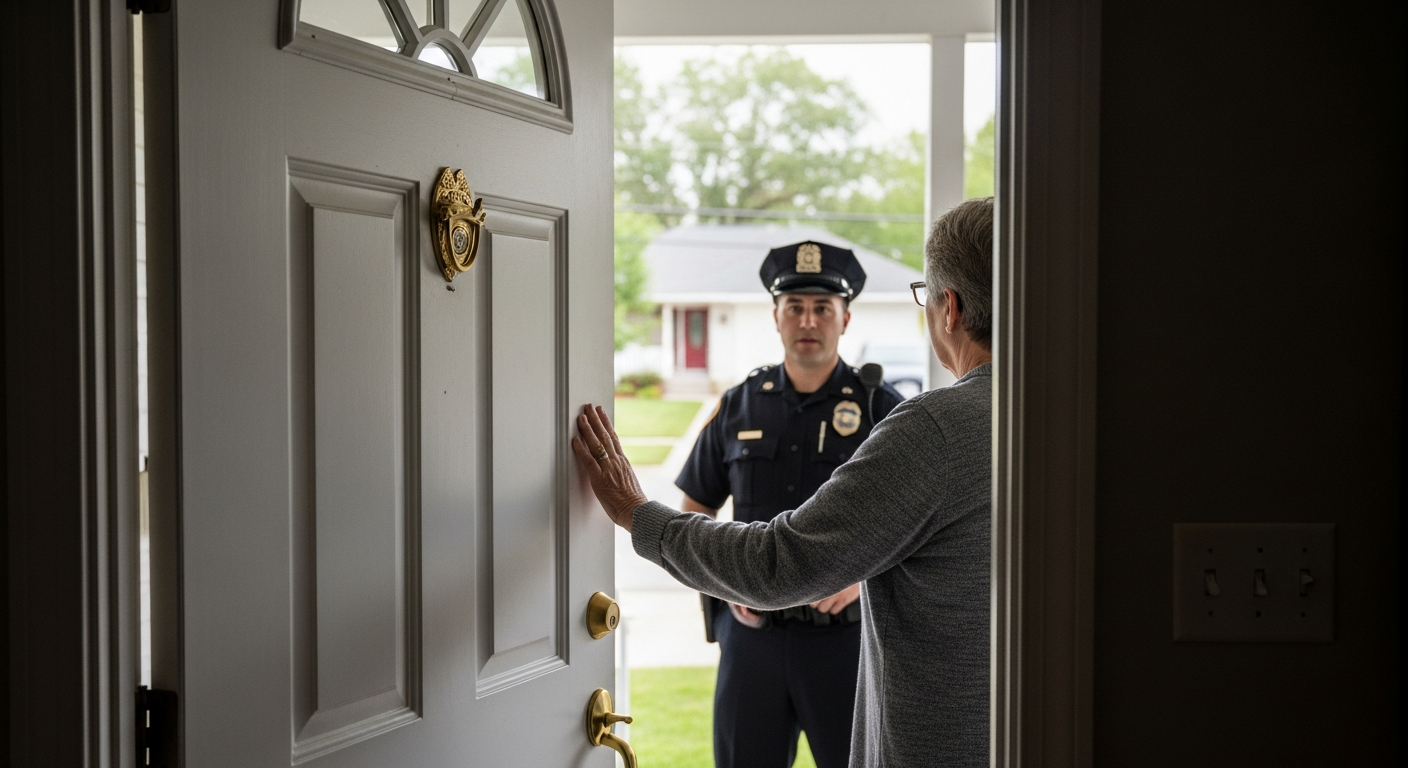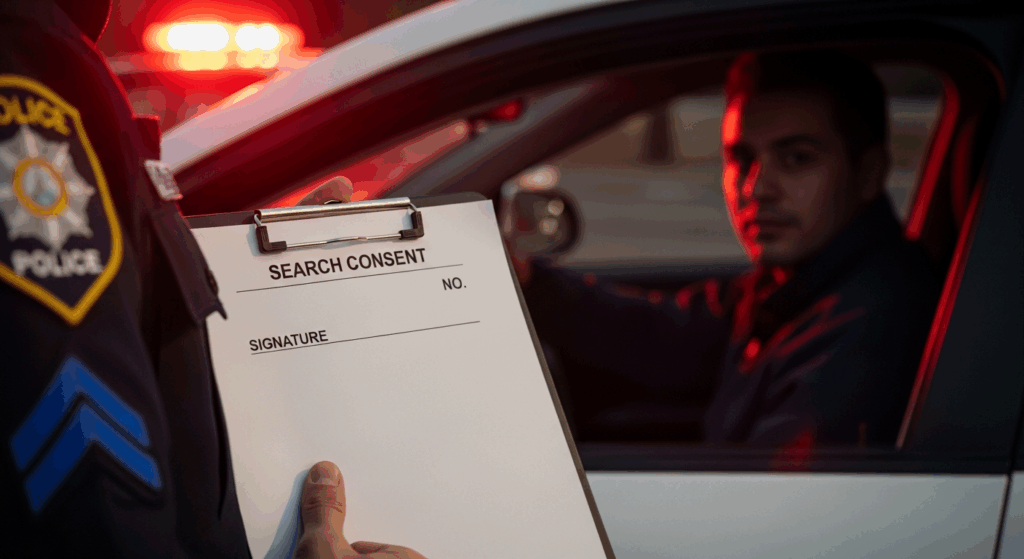
Imagine this scenario: It’s late at night. You’re relaxing at home or pulling into your driveway when suddenly flashing lights appear. At your front door or at your car window, an officer stands, asking to come in or “take a quick look.”
What do you say?
For many Hoosiers, this moment carries more weight than just an inconvenience; it could profoundly affect their legal rights.
As your trusted team of Indianapolis criminal defense lawyers, we are here to walk you through why giving consent isn’t just about being polite; it can shape your entire case.
Here’s the key: you are not obligated to consent to a search.
But deciding whether to consent turns on a complex set of legal rules and consequences. And when you’re facing possible criminal charges, being proactive is critical.
Here, you can learn what the law says, what common traps look like, real case examples, and actionable steps you should take. If you’re under investigation or worried that your rights may be on the line, contacting an experienced defense attorney in Indianapolis, IN, at Eskew Law right away can make a meaningful difference.
1. What the Law Says: Home Searches in Indiana
Under both the U.S. Constitution (Fourth Amendment) and the Indiana Constitution (Article 1, Section 11), you have a fundamental right to be free from unreasonable searches and seizures.
Under Indiana Code § 35-33-5-1, a search warrant may issue only upon probable cause, supported by oath or affirmation, describing the place to be searched and the items or persons to be seized.
What this means for your home:
- The police generally need a warrant to enter and search your home.
- If you permit them (consent), the warrant requirement for that search disappears.
- But there are exceptions; exigent circumstances (e.g., imminent destruction of evidence or risk of harm) may permit warrantless entry.
- Importantly, refusing consent is your right, and in many cases, the preferred option until you’ve spoken to a criminal defense attorney in Indianapolis, IN.
Case Example:
In Pinner v. State (2017), the Indiana Supreme Court held that the search and seizure were unreasonable under the state and federal constitutions. The officers lacked the requisite probable cause, and the intrusion was invalid.
If an officer shows up at your home and asks to search, politely but firmly say: “I do not consent to a search. Please get a warrant.” Then call an Indianapolis criminal defense lawyer right away.
2. What the Law Says: Car Searches in Indiana

You might assume that a car is different; it is. The courts treat vehicle searches somewhat differently, given mobility and the risk of evidence being lost. But your rights are still robust, and a defense attorney in Indianapolis, IN, knows how to challenge overreaches.
Here’s what you should know:
- In Indiana, the police may search a vehicle if they have your consent, OR a valid search warrant, OR probable cause, or another recognized exception.
- The “automobile exception” allows a warrantless search if police have probable cause to believe the vehicle contains evidence of a crime and that the vehicle is mobile.
- Inventory searches (after lawful impoundment) and “plain view” seizures are also common legal bases.
- If the police ask to search, you may refuse. Your refusal may help your defense later.
Case Example:
In State of Indiana v. Friedel (1999), a passenger’s purse in a van was searched without her consent, and the court found the search unconstitutional.
Pulled over or stopped and asked to open your car? Say: “I do not consent to a search of my vehicle.” Then call a trusted Indianapolis criminal defense lawyer.
3. Why Saying “Yes” Has Risks (and Why Saying “No” Can Be Strategic)
At first blush, consenting may feel like the “easy” option: it may keep the stop friendly, and you might think you have nothing to hide. But here’s why giving consent can carry heavy risk:
- Once you say yes, you waive many of your Fourth Amendment safeguards making it hard for your lawyer to fight evidence later.
- Even if the police didn’t have probable cause, your consent eliminates the “illegal search” argument.
- A refusal does not mean you’re hostile or “asking for trouble.” In fact, it preserves key defenses and lets your lawyer explore whether police followed proper procedures.
- Especially in home searches, the “common occupant” consent rules are tricky: one occupant may consent, another may object, leading to serious legal battles (see cases like Georgia v. Randolph).
And on the flip side: withholding consent doesn’t freeze you into silence. You still must comply with lawful commands (such as producing your driver’s license) and avoid creating a dangerous confrontation.
If you’re unsure whether to consent, pause and call a defense attorney in Indianapolis, IN. We can advise you in real time, protect your rights, and set you up for the best possible outcome.
4. Three Steps You Can Take Today
Step 1: Know your exact rights before any interaction.
Memorize these phrases:
- “Am I free to leave?”
- “I do not consent to a search of my home/vehicle.”
- “I’d like to talk to my attorney.”
Understanding the difference between a lawful search (warrant or exception) and one based solely on consent is key.
Step 2: Keep your cool and document what happens.
Remain calm. Record the interaction or take notes. You don’t want to interfere with the officers, but you do want to preserve what was said, whether you were asked to consent, whether you refused, whether you were told you could leave or not, etc. All of that is helpful for your defense attorney.
Step 3: If you think your rights were violated, call us.
Evidence obtained from an unlawful search may be suppressed (excluded) by the court, which could significantly weaken or eliminate the government’s case. As your Indianapolis criminal defense lawyer, we will evaluate whether a motion to suppress is viable and, if so, fight aggressively for you.
5. The Cost–Benefit of Refusal vs. Consent

Most people approach consent with a “better safe than sorry” attitude, but from a strategic defense vantage point, refusal is often the smarter move. Why? Because it preserves the option for your defense lawyer to challenge everything later.
Let’s frame it as a cost-benefit:
- Cost of consenting: you lose the ability to challenge search legality; you may facilitate greater discovery of evidence against you.
- Cost of refusing: You may face a longer interaction or frustration, but you preserve your rights.
- Benefit of refusing: you give your defense attorney a stronger hand; it may lead to less evidence used, lower charges, or even dismissal.
Think of it this way: your decision in that moment is not just “should I comply?” but “how will this decision impact my legal position going forward?” If you have a good Indianapolis criminal defense lawyer lined up or on speed dial, you can make an informed decision—not a reaction born of pressure.
6. Why Your Choice Matters
When law enforcement shows up at your door or on the roadside, the situation is emotionally charged. But your response doesn’t have to be reactive; it can be strategic. The question isn’t just “should I let them in/search my car?” but “how will this choice affect my ability to defend myself later?”
As experienced defense attorneys in Indianapolis, IN, we have seen firsthand how a single moment of consent or silence can set the tone for everything that follows: charges, plea negotiations, and sentencing.
In summary:
- You do not have to consent to a search of your home or vehicle.
- Consent is voluntary, and refusing doesn’t mean you’re obstructing justice.
- The legal standards (warrant, probable cause, exceptions) are complex, and a worthy defense attorney will examine whether law enforcement followed them.
- Saying no preserves your legal options and allows your defense attorney to have a stronger fight on your behalf.
- If you’re under investigation or unsure, contact an Indianapolis criminal defense lawyer immediately. Time matters; decisions matter.
Need Help Now?
If you ever find yourself facing a police request to search your home or car, or if you believe evidence was gathered improperly, don’t wait. Call us today for a confidential consultation. We are your dedicated defense attorneys in Indianapolis, IN, and we will help you protect your rights, evaluate your options, and build a strategy tailored to your case.
Remember: Your rights don’t pause just because the flashing lights came on. Use your voice. Use your lawyer. And use your rights.








